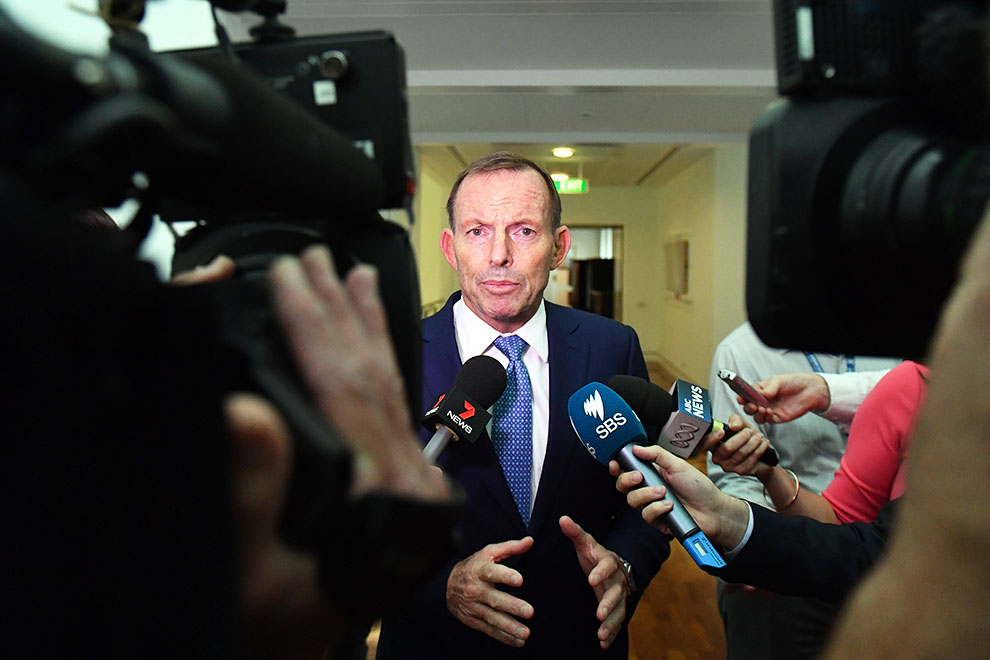Two things are happening to Tony Abbott as he continues to criticise the Turnbull government: he is fast running out of friends, and he is close to joining that infamous band of vindictive political wreckers which includes Billy Hughes, Jack Lang and Kevin Rudd. For all his disastrous tenure as prime minister from 2013 to 2015, Abbott managed to retain a degree of personal affection and goodwill among many of those who decided he needed to go; but just like the political capital he so spectacularly squandered as prime minister, those sentiments are now all but depleted.
Commenting on the former prime minister’s stream of gratuitous advice, one minister said to me, with more than a little exasperation, “I liked Tony, and felt genuinely sorry for him, but now I just see this pathetic figure with too much time on his hands.” Another former close associate said he now tried to avoid bumping into Abbott, adding that there was nothing in what he was saying that was either interesting or useful. “You have to ask why he is doing this, and especially after the ‘no sniping’ promise.”
Other erstwhile admirers, such as Warren Entsch, have called publicly for him to go. “He will either be remembered for his positive contributions in his term as a prime minister or I am fearful that he will eventually end up being remembered as a spoiler,” Entsch told the ABC.
As he takes up a regular radio spot with sympathetic Sydney shock-jock Ray Hadley, Abbott now has another platform from which to launch his broadsides against the government. Those earlier political wreckers – Hughes, Lang and Rudd – pursued vendettas based on wounded pride, recklessly destroying governments and reputations as they went; Tony Abbott is knocking on their door to join that wretched club.
Jack Lang’s megalomania helped destroy the Scullin government in the early 1930s, just as he tore apart the Labor Party in New South Wales after his dismissal as premier in 1932. Even then, Lang was still not done, returning to federal parliament in 1946 as an independent and attacking the Chifley government. His toxic state legacy was reversed only by the political and organisational skills of William McKell, later to be premier and then governor-general, who helped root out the remnants of Langism and enabled the party, minus Lang, to rule the state for almost a quarter of a century.
Billy Hughes was even more damaging than Lang, having split the Labor Party over the conscription issue in 1916 before joining forces with Labor’s conservative opponents, the Nationalists. Under their banner, he continued as prime minister until he was deposed by his own party room in 1923; six years later, he helped orchestrate a revolt that brought down the Nationalist government of Stanley Bruce. Forever plotting, he was instrumental in the dumping of Robert Menzies from his first prime ministership in 1941.
In more recent times, Kevin Rudd was never able to accept that he had been displaced in 2010. His cynical manoeuvrings to discredit his successor, Julia Gillard, and destabilise her government effectively smashed Labor’s credibility, opening the way – notwithstanding Rudd’s brief return to the prime ministership – for Tony Abbott’s election win in 2013.
Abbott’s ongoing assault on the Turnbull government carries similar self-serving overtones, with the one-time leader positioning himself as the saviour once Labor, as the polls increasingly suggest, wins the next election.
Former Liberal leaders, such as Menzies, Malcolm Fraser and John Howard, could comfortably assume the elder statesman mantle in a way that Abbott simply cannot. Of all twenty-eight former prime ministers, Abbott was arguably the least competent of all, and his occasional linguistic lapses (“suppository” rather than “repository,” for instance) evoked shades of another undistinguished leader, William McMahon.
McMahon’s constant verbal slips during the 1972 campaign reinforced his image as a figure of fun. One example, much quoted, was “We will honour all the problems we have made.” But at least McMahon, for all his faults, and they were many, managed to hold together a tired and fraying Liberal Party that had not yet recovered from Menzies’s retirement nearly seven years earlier.
As a political strategist, Abbott’s only claim to fame rests on his exploitation of a wounded Labor Party in 2013, a feat one might imagine being well within the competence of a drover’s dog. His recent musings about political trouble ahead for the government, supposedly gleaned from talking to people on his latest charity bike ride, simply reflect what has been obvious in a succession of opinion polls.
Abbott’s grab-bag five-point program to turn the government’s fortunes around might carry some weight if someone else were proposing it. But it is simplistic to think that such issues as cutting the renewable energy target, slashing immigration, abolishing the Human Rights Commission, reducing spending and reforming the Senate will breathe life into a moribund and directionless government characterised by a treasurer flying pre-budget policy kites that are then shot down by his colleagues. The rot is much deeper and Abbott is part of it. The man who failed to devise any sort of governing narrative can still do no better than “stopping Labor” at the next election.
Indeed, Abbott’s offering of advice is especially inappropriate given that he proved deaf, as prime minister, to those warning him of pitfalls facing his government, including the baleful influence of his chief adviser, Peta Credlin (an issue, according to sources, dealt with in the unreleased review of the Liberal Party’s 2016 campaign).
For a government already in deep trouble of its own making, Tony Abbott’s advice merely helps dig a deeper hole – and ensures it will not get out. Welcome to the club, Tony. •




